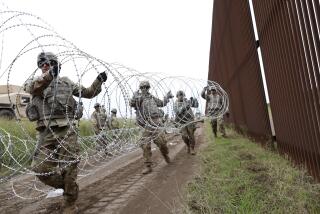Obama orders launch of Afghanistan strategy, prepares to address U.S.
Reporting from Washington â Hours after issuing orders to launch his new strategy in Afghanistan, President Obama this morning began calling world leaders to tell them of his decision and ask for their assistance.
But Obama does not plan to disclose the number of new troops he will deploy to the war zone until Tuesday, when he plans to inform a bipartisan group of members of Congress at the White House and then address the nation in a speech from West Point.
âHeâs not going to get overly specificâ in his calls to world leaders, Press Secretary Robert Gibbs told reporters this morning. âIf you call the embassy of France, they wonât know the number either.â
The president gave orders to military leaders to begin implementing his strategy Sunday night in the Oval Office. After informing top officials of his administration about his plans at about 5 p.m. Eastern, the president spoke by secure video conference from the White House situation room with Gen. Stanley McChrystal, commander of military forces in Afghanistan, and Karl Eikenberry, the U.S. ambassador to Afghanistan.
Obama this morning spoke with French President Nicolas Sarkozy, and planned to speak with Russian President Dmitry Medvedev over the noon hour. He planned calls to British Prime Minister Gordon Brown this afternoon and likely the leaders of Afghanistan and Pakistan later today.
Meanwhile, the president continues crafting an address to the American public that he will deliver in a televised speech Tuesday evening. Even as he announces a troop build-up, Obama plans to pair that with a message about the ultimate goal of turning the responsibility for a secure Afghanistan over to the Afghan people.
âYou will hear the president discuss clearly that this is not an open-ended commitment,â Gibbs said. âThis is about what has to be done so the Afghans can secure their country.â
In his Tuesday night speech, the president is expected to speak about ensuring progress in the training of Afghan military and police forces as well as improving local governance. He also will speak about improving the U.S. relationship with Pakistan and its importance in disabling Al Qaeda, according to aides.
In his discussion of sending more U.S. military personnel to the region, the president plans to discuss the limits on those resources as well as the financial burden of deploying troops.
In a morning discussion with reporters, Gibbs repeatedly emphasized the importance of an endgame strategy for the war in the presidentâs discussions. The goal is to train the Afghan people to take on an âunpopular insurgency,â Gibbs said, and ultimately to turn that job over to them.
More to Read
Get the L.A. Times Politics newsletter
Deeply reported insights into legislation, politics and policy from Sacramento, Washington and beyond. In your inbox three times per week.
You may occasionally receive promotional content from the Los Angeles Times.











